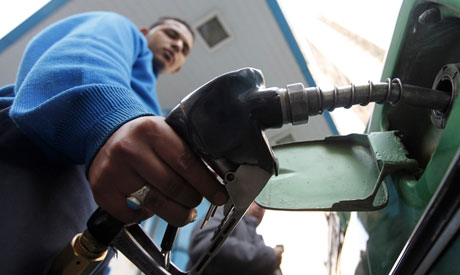 Egyptian petrol stations are currently suffering this year's third fuel shortage, with motorists across the country frequently forced to wait in long lines to fill up their tanks.
Egyptian petrol stations are currently suffering this year's third fuel shortage, with motorists across the country frequently forced to wait in long lines to fill up their tanks.
Egypt has been struck with two serious fuel shortages this year, first in January and again in March. Authorities at the time attributed the shortfall to several reasons, including bad weather that negatively impacted imports, panic-buying and hoarding.
According to Medhat Youssef, general manager of Egypt's Co-operation Petroleum Company, the government is still supplying the nation's petrol stations with the same quantities of fuel.
"There is no genuine supply shortage," Youssef asserted to Ahram Online.
In 2011, Egypt’s total annual petroleum production stood at 54 million tonnes, while total annual consumption reached 53 million tonnes for the same period, according to official data.
Youssef linked this year's frequent petroleum shortages to Egypt's current tenuous political situation.
"I think this is an artificial crisis; I believe it's related to politics and the current presidential race – maybe some of the presidential candidates are even involved," he said.
Egypt's presidential runoff, slated for 16 and 17 June, will pit Mubarak-era minister Ahmed Shafiq against the Muslim Brotherhood's Mohamed Mursi.
Whatever the cause, Egyptian motorists are continuing to suffer, especially those in rural areas that rely on octane 80 and 90. According to Youssef, many of them are currently stocking up on the badly-needed fuel.
Hani Dahi, head of the Egyptian General Petroleum Corporation (EGPC), did not answer calls from Ahram Online to comment on the issue.
One litre of octane 80 currently retails for LE0.9 ($0.15), octane 90 for LE1.75 ($0.29), octane 92 for LE1.85 ($0.3), and the high-quality octane 95 for LE2.75 ($0.45).
On Tuesday, Egyptian Finance Minister Momtaz El-Saeed stated that his ministry would lend the petroleum ministry with an additional $100 million with which to provide the local market with sufficient fuel to meet domestic demand.



